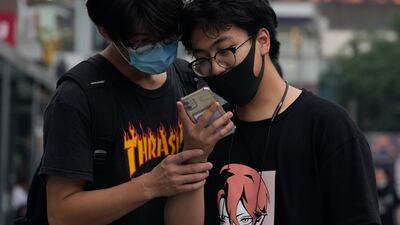China is the world’s only major country dispatching nearly all of its crown jewels of the modern-day economy for listings offshore. Two hundred and fifty such companies are publicly listed in the US, worth roughly $1.5 trillion in market cap.
If China is to become the world’s most consequential power in the 21st century, its domestic capital markets must finance its own rise, and subsequently, that of the developing world.
Instead, no global power over centuries of capitalism can conceive a capital market exodus by its prized corporate champions as we see in China today. The world’s largest public listings have all been staged in New York since 1945, and each of these IPOs out of China have further bolstered the metropolis as the pinnacle of global finance. The companies listed abroad are e-commerce giants, monopolistic search engines, sharing economy behemoths, new energy vehicles and game-changers in entertainment and education.
Had Ant Group’s IPO not been abruptly cancelled in Hong Kong in November, it would have marked, for the first time since after World War II, the world’s largest IPO shifted to Asia.
China's president Xi Jinping has labeled the US the biggest threat to national security and development interests.

The industries under China’s current regulatory siege appear idiosyncratic. China’s state apparatus targeted practically a new sector every day in the first two weeks of August, causing market dives for K-thru-12 education and training providers, online gaming, the liquor industry, milk formula sellers, short-form video apps and online insurers. There was no obvious connections among them.
There is one common synthesis, however.
The rapid rise of modern private companies in China has inevitably been accelerated by the game of capital. Capitalism or not, China’s productivity is increasingly driven by capital investment in technology. China’s economic ascent cannot sustain without its financial ascent in parallel.
London financed the world over the 19th century, New York in the 20th century and onwards, and China likely in the 21st century. But no global financial centre is ultimately successful if it cannot finance its best companies on its own shores.
The corporate exodus to offshore markets proves the challenge facing Chinese capital markets.
The country’s GDP was nearly three times bigger than Japan’s in 2020. Yet Japan’s stock exchange valuation is about 37 per cent larger than China’s.
China was about 78 per cent of the economic size of the US in 2020. Yet China’s three main bourses combined traded at only a tenth of the valuation of the US exchanges.
The Chinese internet tsar requires domestic companies holding over 1 million users' data to seek approval for overseas listings as of July 3. For a market the size of China’s, nearly all listed entities will qualify. The SEC has, concurrently, halted Chinese listings in the US amid accelerated Chinese regulatory risks and the failure to submit corporate audit records. Regulators from both the US and China have jointly arrested Chinese listings in the US.
Over 200 public equity offerings stand in the queue at the Hong Kong Stock Exchange, the busiest period seen at the bourse, while secondary listing inquiries are markedly higher following the Chinese government’s took measures against Didi on July 2.
Benefits abound for Beijing when Chinese companies look to the Hong Kong Stock Exchange.
One, all corporate financial activities become transparent to Beijing instead of the US Securities and Exchange Commission, which compels listed companies to submit three years of audit records. The listing rules at the Hong Kong Stock Exchange are subject to Beijing. For evidence of that: Ant Group’s IPO was simultaneously called off by both the Shanghai and Hong Kong exchanges slated for November 3, indicating Beijing’s invisible rule over Hong Kong’s public market.
Two, the Hong Kong-Shanghai and Hong Kong-Shenzhen Connect schemes will enable middle-class Chinese to participate in the equity raises of domestic companies. With a closed capital account, ordinary Chinese have been closed out of investing in hot Chinese companies like Alibaba – an irony for a nationalist China.
“Common prosperity is not the prosperity by some,” said Mr Xi when he initiated a national move to equalise wealth distribution at the Central Finance Leadership meeting last week, calling for the restructuring of the income distribution system, benefiting the rising middle and rural classes, while aiming to limit the country’s super-rich.
With this, China formally bids farewell to Deng’s authoritarian capitalist philosophy of “letting some get rich first”. It now embarks on Xi’s socialist pursuit toward “common prosperity”.
Regulating the vibrant and privately held tech-enabled economy removes the privilege of the country’s super-rich, while bringing Chinese listings from the US home empowers wealth creation for the ordinary.
Unicorns speak to the vitality of the economy and the potential for the scheme. Of the 484 global unicorns in 2019, 206 were Chinese, and 203 were American. Over the coming decade, the world’s biggest IPOs will increasingly debut in China if the current Chinese statecraft proves successful.
China will turn itself into a magnet of global capital following the return of Chinese companies.
US billionaires Ray Dalio and Stephen Schwartzman presage China’s financial ascent. Mr Dalio predicts the RMB will take up 10 per cent of the global currency reserve in the current decade, a more than threefold increase from current levels. Mr Schwartzman boasted of Blackstone’s staggering 100 per cent return in Chinese data centres within a year.
“If all our assets can generate this return, we would be managing all the money in the world,” he told former Chinese Finance Minister Lou Jiwei.
But it is increasingly politically unpopular to bank on the Chinese century in the West, despite the historically obvious. Chinese corporate champions will return home. Following them, global capital will arrive. Symbiotically, a new centre of global finance will emerge: China.


